Can Guinea Pigs fart? Absolutely!
Just like any mammal, guinea pigs are subject to the same bodily functions as the rest of us.
However, if you hear your guinea pig farting, it may be time to pay attention.
Occasionally, it can be a sign of a bigger problem.
Table of Contents
Do Guinea Pigs Fart?
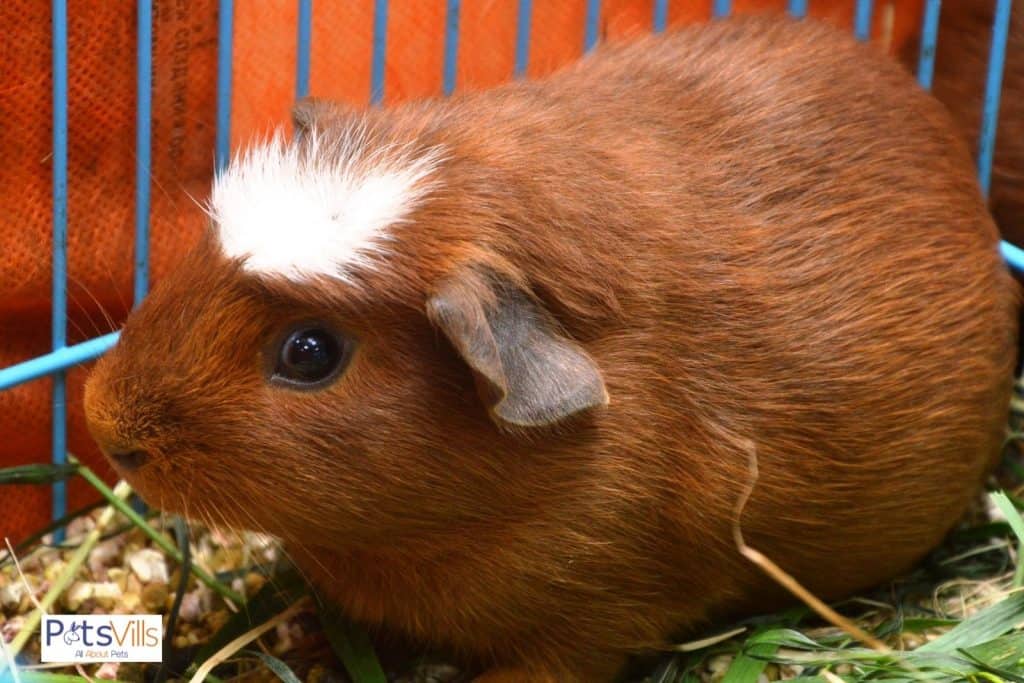
Guineas pigs definitely do fart. Most mammals do, with the sloth being an exception.
While the specifics vary greatly between species, the underlying blueprint for the mammalian digestive system has a couple of common features.
Gas levels build up in the digestive system. A lot of the gas comes from air swallowed when eating or drinking.
The rest of the gasses are a product of the digestive process, such as fermentation.
The specifics of the cavy digestive system differ from ours, but they are a closer match than many other familiar mammals, like cats and dogs.
Cavy farts are nothing to worry about in general. Their diet is usually high in foods that cause flatulence.
The concern is that they may not release the gas buildup and consequently suffer guinea pig bloat. Bloating in piggies is the same as in humans, except that they cannot forcibly pass gas.
Bloating can lead to a loss of appetite. That is where it becomes more concerning. Gastrointestinal pain and loss of appetite could be a sign that something is not right.
Therefore, regular farting is not only fine. It is a sign that your cavy’s digestive system is functioning properly.
READ MORE: Can Guinea Pigs Stay Outside?
Bloat and Gas in Guinea Pigs
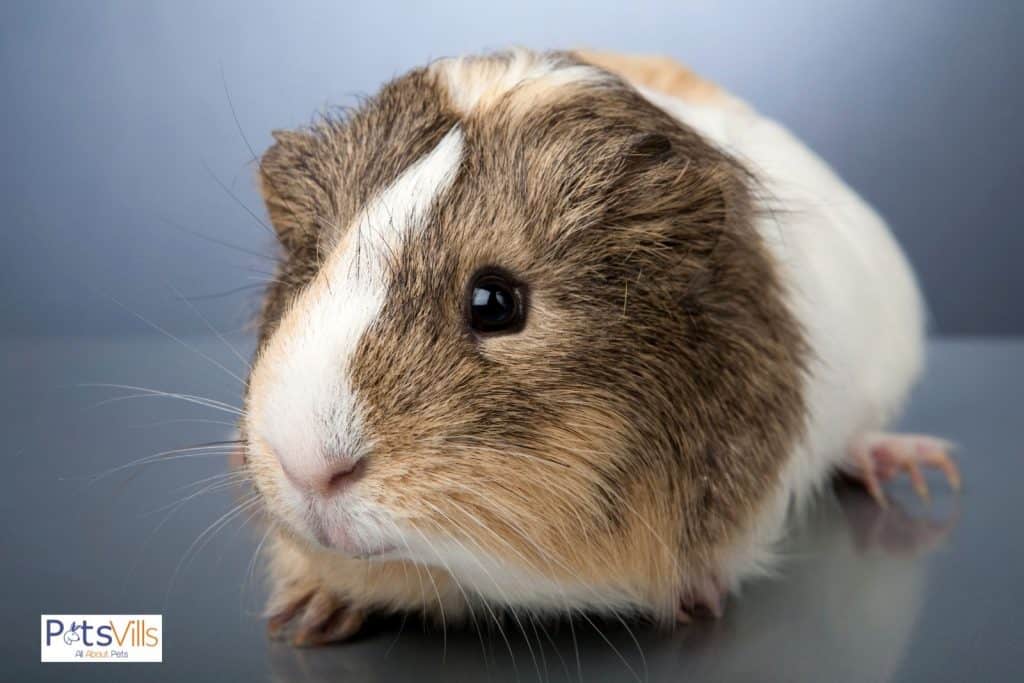
Gassiness and the occasional fart are perfectly natural. Most mammals fart. A healthy guinea pig eats a diet that is pretty high in guinea pig food associated with flatulence.
For example, broccoli and bok choy are good for your guinea pig, but they can cause bloating or excessive farting.
The normal buildup of gas in the digestive system need not be due to diet, though. However, if the buildup starts causing other bloating-related symptoms, it may be cause for concern.
Even simple excessive gas buildup can be fatal, but there is an even greater threat.
A Twisted Bowel
Intestinal twisting is a serious condition prevalent in many mammals.
Twisted intestines block the gastrointestinal tract and restrict the digestion process. The condition makes it impossible for your cavy to pass gas or food waste.
If left untreated, the condition is fatal. In addition, your cavy will be subject to various associated ailments and experience aggravated comorbidities, such as increased blood sugar problems.
Before long, a cavy with a twisted intestine will likely suffer viral or bacterial infections and intestinal impaction.
If it comes to this, there may be little that you can do to help your cavy.
On top of bloating, symptoms include:
- a distended belly
- hairball impaction.
- A lack of appetite
- and no bowel movement further support the possibility.
You should notice that your cavy is eating less than normal. Piggies are pretty consistent in their appetites, so refusing to eat should raise the alarm.
A guinea pig suffering from a twisted bowel will become lethargic as well. Additionally, their breathing will become heavy.
If the symptoms persist for longer than 24 hours, it’s time to make an emergency trip to the cavy doctor.
Compulsive Eating
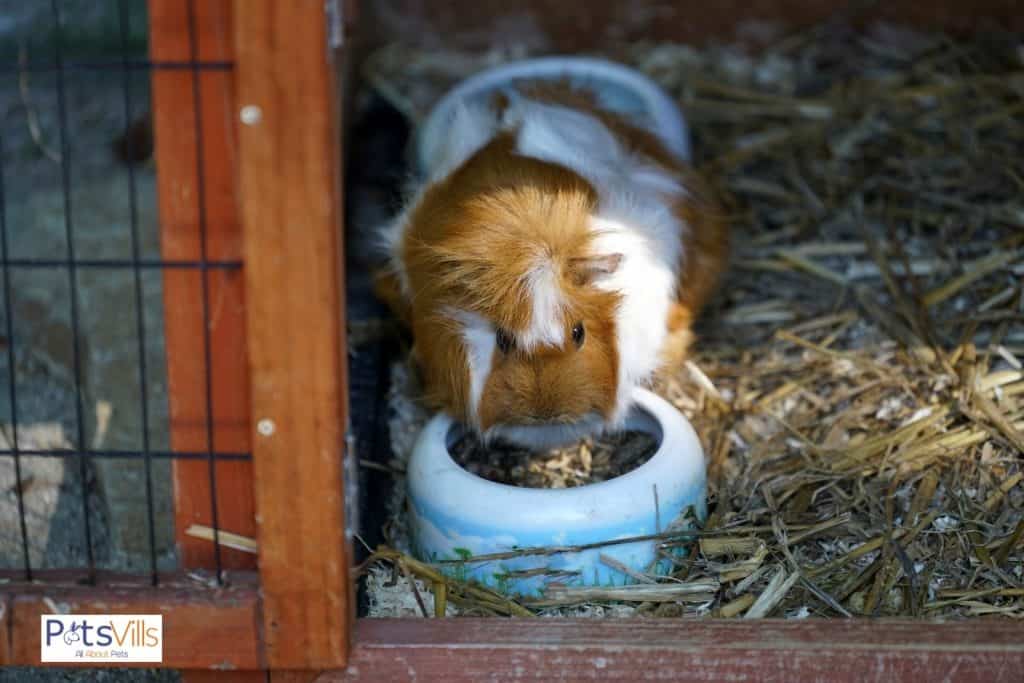
That is another habit our fluffy cavy friends share with their human counterparts. Piggies can engage in compulsive eating in response to stress, loneliness, and boredom.
An isolated guinea pig will often display various self-destructive behaviors. In addition, piggies are highly social animals, and you should never keep only one.
In fact, the Swiss have a law expressly prohibiting keeping a single Guinea Pig. There is a humane reason to back this kind of litigation.
A solitary cavy will show symptoms of guinea pig depression and might either starve or eat itself to death.
The latter need not necessarily be a result of circumstances that extreme. In most cases, it is a simple matter of boredom and anxiety.
Regardless of why your cavy is overeating, it can lead to a swollen belly and excessive gas issues.
Eating After Exercise
Just like with other mammals, eating directly after strenuous physical activity can cause gassiness for guinea pigs. As a rule of thumb, a cavy should wait fifteen minutes after exercise before eating.
It is important to point out that you will likely struggle to micromanage a cavy’s activity and exercise. Fortunately, this kind of farting is harmless to your cavy.
Change in Diet
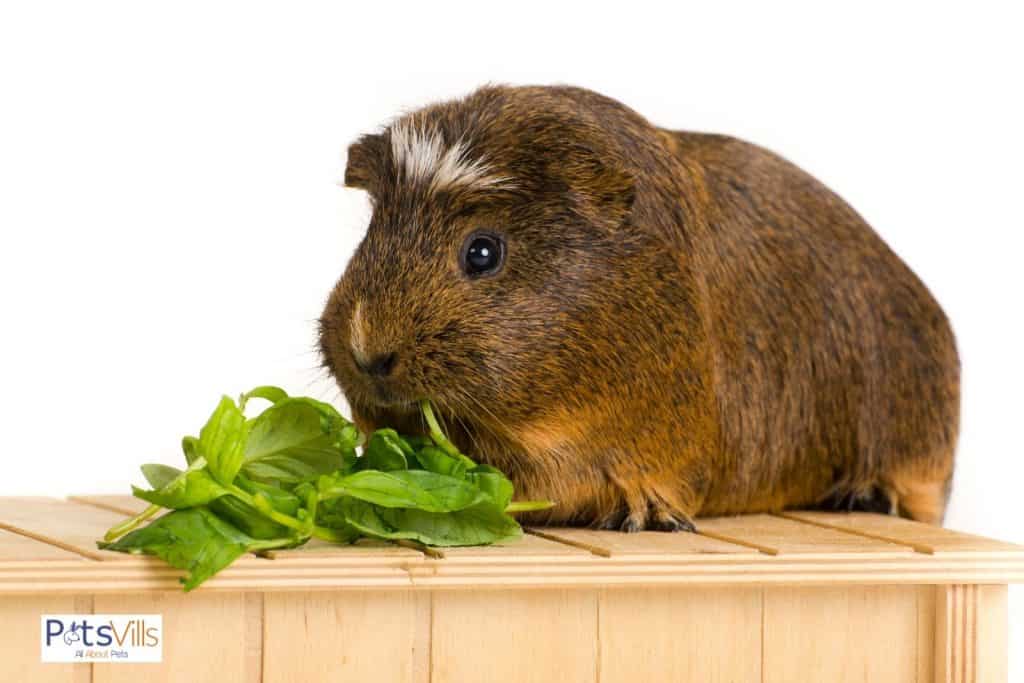
Guinea Pigs can experience a bloated belly and increased or excessive gassiness following a change in diet.
There exists a wide range of potential reasons this could happen.
The new food may be higher in ingredients that cause flatulence. Alternatively, your guinea pig could have a dietary intolerance and digestive issues that manifest as bloating and excessive farting.
Some dietary tolerances have serious consequences for your cavy’s health. Keep an eye out for constipation or diarrhea.
If you suspect an intolerance consult your vet on the changes and what you should add or remove from your cavy’s diet.
Intestinal Parasites
Coccidia is a parasite commonly found in rodents and small mammals. They cause the condition called coccidiosis.
While this parasitic infection does not always cause noticeable symptoms, serious infections can cause diarrhea, give your cavy bloat, and lead to dehydration.
Exocrine Pancreatic Insufficiency
Exocrine pancreatic insufficiency, or EPI, is a condition related to diabetes.
The pancreas does not produce enough digestive enzymes. As a result, cavies are vulnerable to diabetes and can suffer EPI.
The damage this does to natural digestion leads to several problems, including excessive farting, as well as severe bloating.
Enteritis
Enteritis is another condition that can cause bloating and excessive farting. It can result from viral and bacterial infections, as well as an autoimmune response common in mammals.
Germs settle in the small intestine, causing inflammation, swelling, pain, and of course, bloating and farting.
Inflammatory Bowel Disease
Inflammatory bowel disease is relatively uncommon throughout the mammalian family. However, it can affect both humans and guinea pigs, with serious health repercussions.
Crohn’s disease and ulcerative colitis are both forms of inflammatory bowel disease. The damage done in the gastrointestinal tracts of cavies mirrors the damage we see in humans.
These inflammatory gastric conditions can lead to excessive bloating and gassiness. As with most of the conditions mentions, you should always seek professional veterinary advice immediately as it may require a vet to perform invasive procedures.
Respiratory Disease
Respiratory diseases do not cause gassiness directly. Instead, the problems it causes to normal breathing cause an animal to swallow more gas than normal. As a result, gas builds up, and your guinea pig expels it by farting.
Fermentable Fibers
Fermentable fiber can do exactly that when ingested. Ferment. Fermentation releases a lot of gassy byproducts, and it is these gasses accumulate and contribute to bloatedness and excessive farting.
Fermentable fibers are present in some fruits and vegetables and the plant matter of various plants. Beans and legumes are particularly high in fermentable fibers.
Small Intestinal Bacterial Overgrowth
SIBO is a condition in which the flora in a Guinea Pig’s small intestine goes into overdrive, overwhelming the small intestine’s natural biome and wreaking havoc on the digestive system. Bloating and excessive farting are two of its many symptoms.
Often the flora associated with SIBO is not naturally endemic to the guinea pig’s small intestine.
As the other, healthy bacteria cannot outcompete or destroy the unfamiliar new lifeforms, the population of the invasive bacteria can skyrocket in a surprisingly short time.
Also referred to as blind loop syndrome, SIBO often results from the slowed-down passage of food through the digestive system, giving invasive bacteria the ideal breeding ground.
Aside from bloating and gassiness, small intestinal bacterial overgrowth often leads to diarrhea and weight loss, inevitably followed by malnutrition.
SIBO is usually treated with antibiotics, although severe cases may require surgery.
Check this informational video:
READ MORE: Do Guinea Pigs Know Their Owners?
How Can I Stop Excessive Farting in My Guinea Pig?
If you’re worried about your piggy’s excessive farting, keep reading for a few tips on how to treat it.
Treatments for Bloating and Excessive Gassiness
Remember, your vet should be the first person you talk to if you feel that your cavy needs treatment. Most often, these are the things they’ll recommend.
1. Non-invasive Treatment
There are a couple of treatment options available to your cavy. First, if the problem is not severe or you unsure whether it is particularly serious, you can opt for non-invasive treatments.
There are medications to treat gassiness. A combination of probiotics and antibiotics can aid in restoring a healthy gastrointestinal flora.
Your vet may prescribe pain medication at their discretion to relieve the serious discomfort your cavy could be experiencing.
2. Invasive Treatment
Invasive surgery is the last resort. Cavies might suffer excessive gas and bloating many times during their lives. Except for gut impaction and a twisted bowel, invasive surgeries are impractical as a long-term solution.
Surgeries can also do more harm than good in the long term.
3. Eliminate Certain Foods
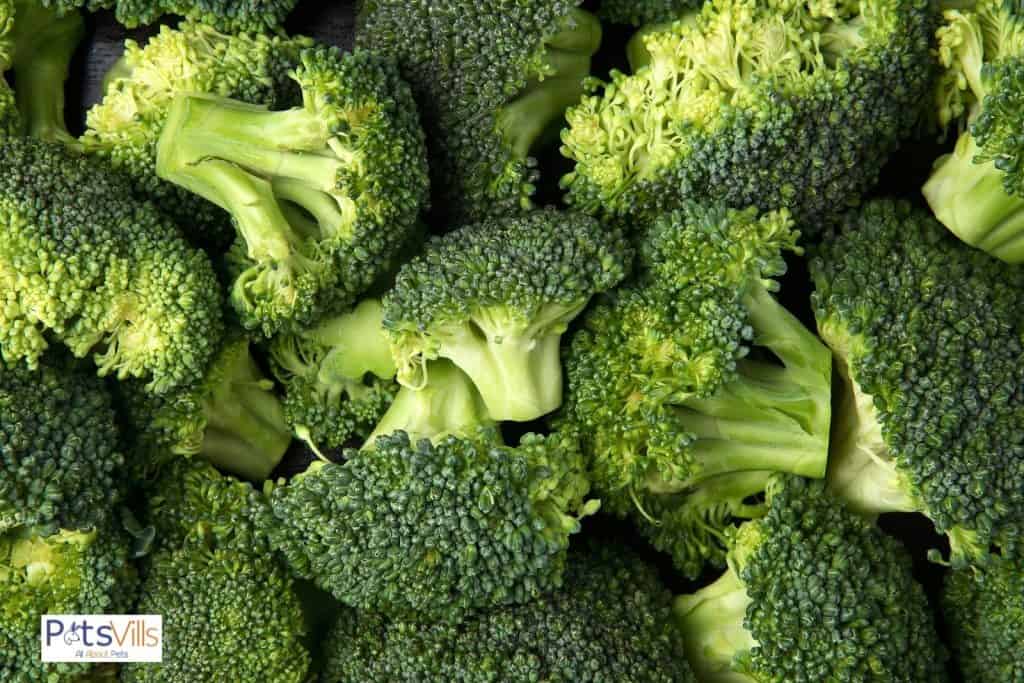
Another solution is to reduce or completely restrict certain fresh foods.
Cauliflower, collards, greens, and cabbage are the major culprits, as well as broccoli, bok choy, and peppers.
Whatever you do, you cannot eliminate gassiness in your guinea pig. Besides, to do so would be extremely detrimental to their health.
The best you can do is to ensure that your cavy doesn’t have a diet high in flatulence-inducing foods, that all its food is fresh and that its water is always clean.
Is it Necessary to Treat Farting in Guinea Pigs?
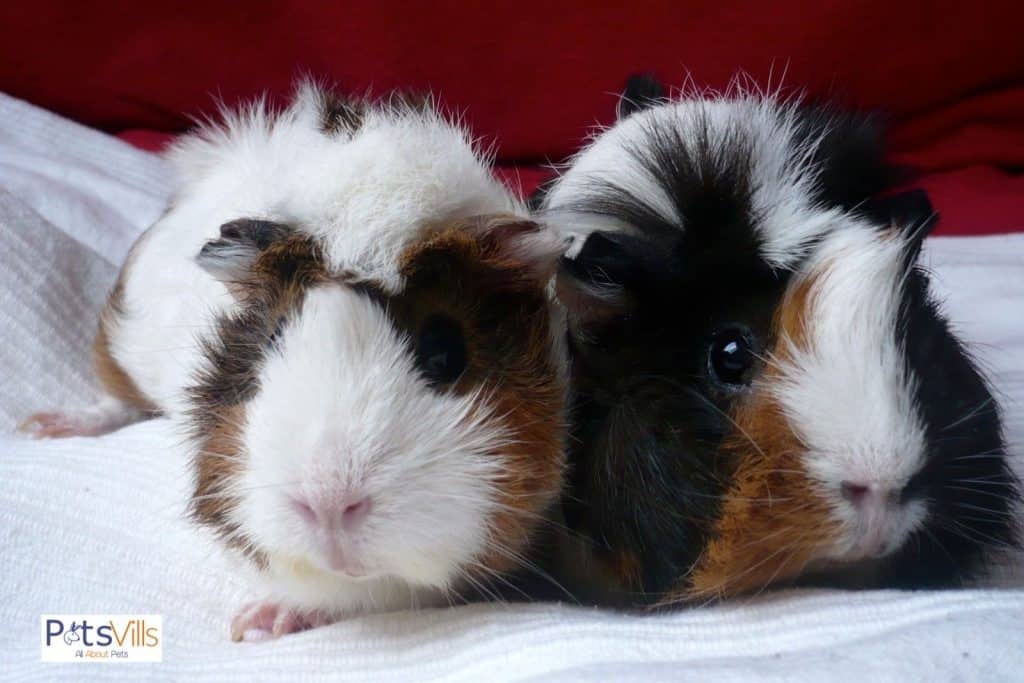
It is an important question. In most cases, the answer is no. You do not have to stop your guinea pig from farting too much.
It is probably very dangerous to their well-being to interfere with this natural biological process.
Guinea pigs fart for the same reasons we humans do, and as we know, it is an important bodily function.
FAQs
Are guinea pigs very smelly?
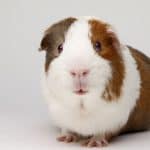
While Pigs produce some gas and their urine can be pretty pungent, they are usually very clean animals. If their cage and environment are cleaned out regularly, there is no reason that they should be very smelly. In fact, a smell can be a sign that their environment is not being properly cared for, or that they are not being adequately groomed.
Is it normal for a guinea pig to fart?
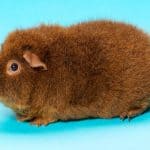
It is normal for guinea pigs to fart. Most mammals fart. It is an almost universal trait of the blueprint underlying the mammalian digestive system.
Can guinea pigs die from farting?
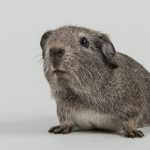
No, Guinea pigs cannot fart themselves to death. However, both farting and a lack of farting can indicate underlying conditions that may be dangerous and potentially lethal. If you are concerned, look for signs of bloating and abdominal pain and visit a veterinarian
What foods cause gas in guinea pigs?
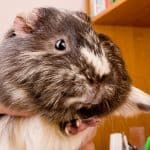
While many foods can contribute to gassiness and bloating in guinea pigs, cruciferous vegetables like cabbage and cauliflower, along with bok choy, are the main antagonists.
Do guinea pigs burp?
Yes, guinea pigs do burp. However, the process is completely involuntary, and they can’t control or hold it back as humans do. Cavy burps, much like guinea pig farts, are often silent.
Do guinea pigs hiccup?
Guinea pigs can hiccup. They seem to experience it rather badly when it does occur, with intensities that mimic what we humans experience as ”heaving hiccups.”
Conclusion
Guinea pigs fart, and it is just as natural for them as it is for us. Excessive farting and bloating can indicate several underlying problems, some of which are quite serious. However, the latter is rarely the case, with most cavy farts a natural product of a working digestive system.
References
- “Altered Transit and Bacterial Overgrowth in the Cystic Fibrosis Mouse Small Intestine | American Journal of Physiology-Gastrointestinal and Liver Physiology.” 2020. American Journal of Physiology-Gastrointestinal and Liver Physiology. 2020. https://journals.physiology.org/doi/full/10.1152/ajpgi.00548.2006.
- Balk MW;Lang CM;White WJ;Munger BL. 2021. “Exocrine Pancreatic Dysfunction in Guinea Pigs with Diabetes Mellitus.” Laboratory Investigation; a Journal of Technical Methods and Pathology 32 (1). https://pubmed.ncbi.nlm.nih.gov/1089836/.
- DeCubellis, Julie, and Jennifer Graham. 2013. “Gastrointestinal Disease in Guinea Pigs and Rabbits.” Veterinary Clinics of North America: Exotic Animal Practice 16 (2): 421–35. https://doi.org/10.1016/j.cvex.2013.01.002.
- Randhawa, Puneet Kaur, Kavinder Singh, Nirmal Singh, and Amteshwar Singh Jaggi. 2014. “A Review on Chemical-Induced Inflammatory Bowel Disease Models in Rodents.” The Korean Journal of Physiology & Pharmacology 18 (4): 279. https://doi.org/10.4196/kjpp.2014.18.4.279.
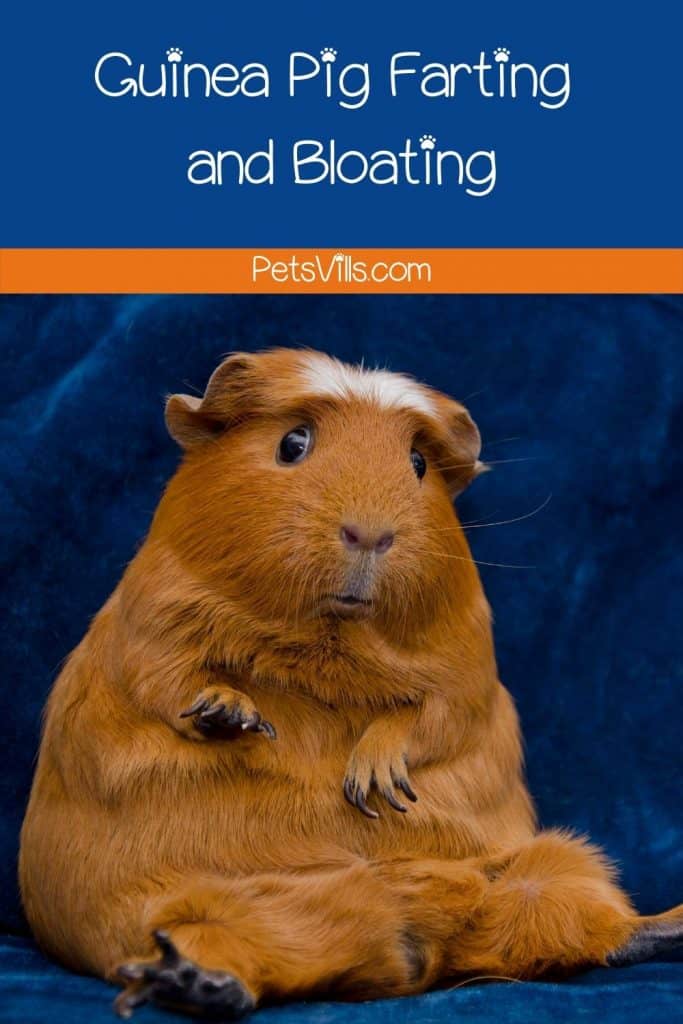
What are your thoughts on guinea pig farting? Please share with us below!

